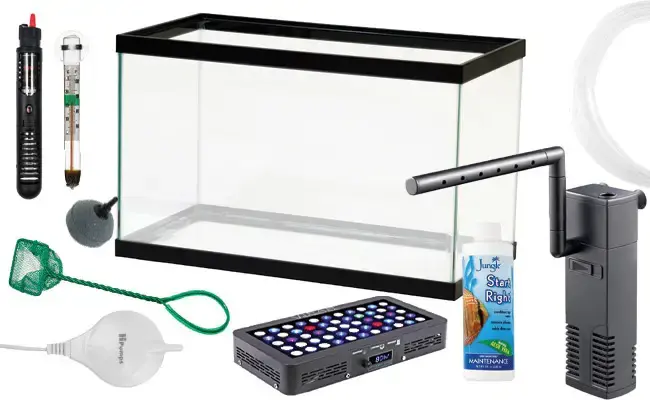
If you're just getting into the world of fishkeeping, it's easy to feel overwhelmed by all the gear available. But don’t worry—this guide breaks down the essential equipment every beginner needs to set up a healthy and successful home aquarium. Whether you're keeping coldwater or tropical fish, having the right tools from the start will help ensure your fish thrive in a safe and clean environment.
1. Fish Tank (Aquarium)
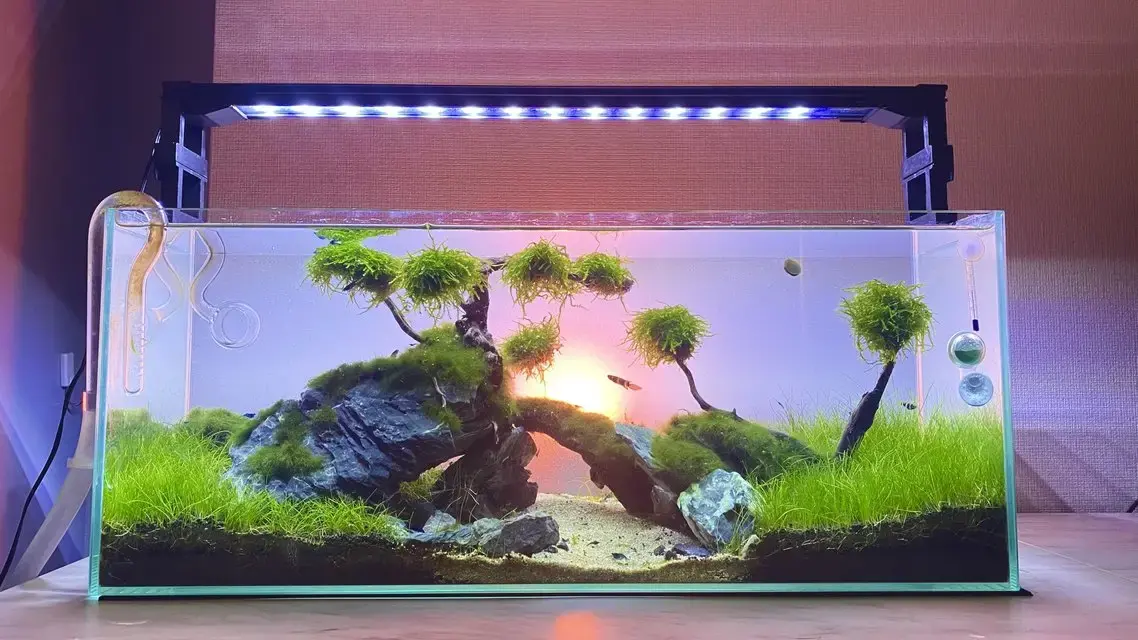 Choosing the right size tank is one of the most important first steps. While it might seem easier to start small, a larger tank is actually more forgiving for beginners. A 20-gallon aquarium is often recommended as a starting point because it provides more stable water conditions and room for your fish to swim and grow.
Choosing the right size tank is one of the most important first steps. While it might seem easier to start small, a larger tank is actually more forgiving for beginners. A 20-gallon aquarium is often recommended as a starting point because it provides more stable water conditions and room for your fish to swim and grow.
When selecting a tank, consider the type of fish you plan to keep, your available space, and your budget. Make sure the tank is made of high-quality glass or acrylic and has a secure lid to prevent fish from jumping out.
2. Water Conditioner
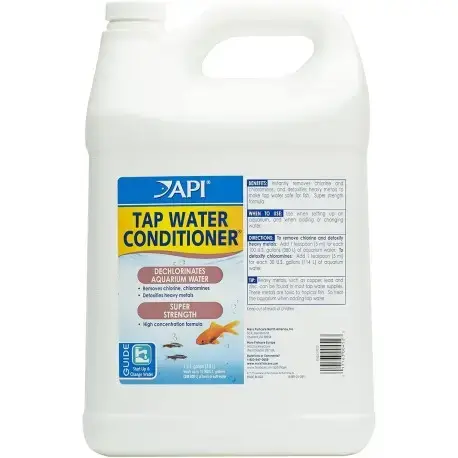
Tap water usually contains chlorine and chloramine, which are harmful to fish. A good water conditioner neutralizes these chemicals, making tap water safe for aquarium use. Always treat the water when setting up your tank and during regular water changes.
3. Aquarium Heater (For Tropical Fish)
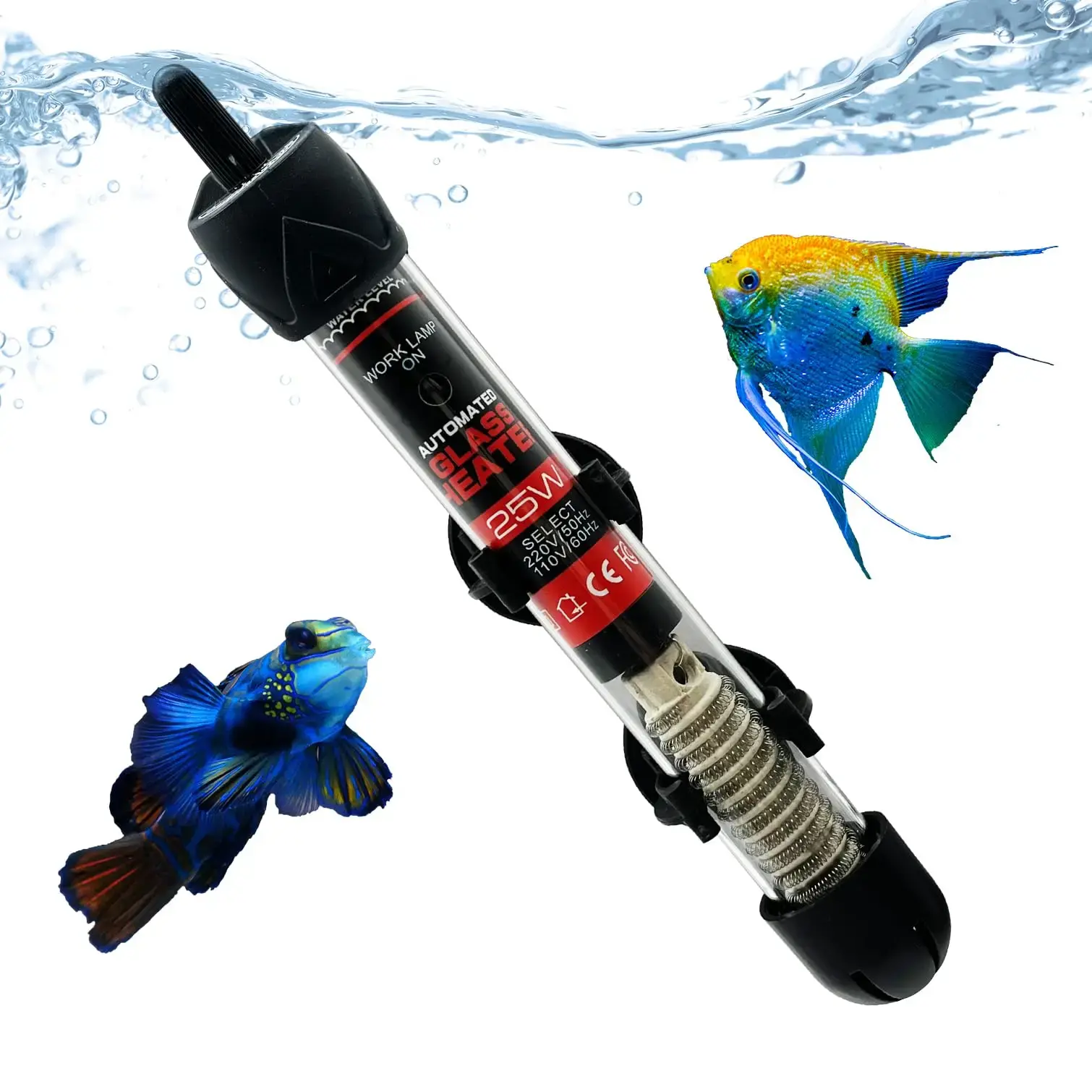 If you're keeping tropical fish, a reliable aquarium heater is a must. Most tropical species require stable temperatures between 75°F and 80°F (24°C to 27°C). Choose a heater suitable for your tank size and include an adjustable thermostat for accuracy. Coldwater species like goldfish typically don’t require a heater.
If you're keeping tropical fish, a reliable aquarium heater is a must. Most tropical species require stable temperatures between 75°F and 80°F (24°C to 27°C). Choose a heater suitable for your tank size and include an adjustable thermostat for accuracy. Coldwater species like goldfish typically don’t require a heater.
4. Aquarium Filter
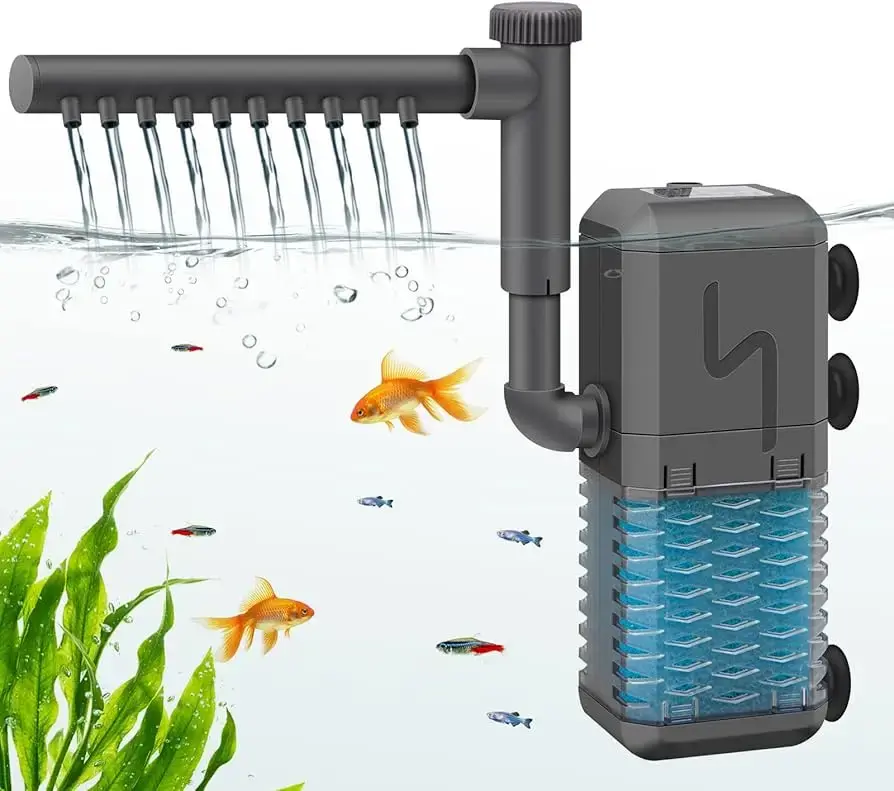 A filter is essential for keeping your tank water clean and your fish healthy. It removes debris, breaks down harmful waste chemicals, and helps maintain beneficial bacteria. There are several types of filters (hang-on-back, sponge, canister, internal), but for beginners, a hang-on-back filter or sponge filter is easy to use and maintain.
A filter is essential for keeping your tank water clean and your fish healthy. It removes debris, breaks down harmful waste chemicals, and helps maintain beneficial bacteria. There are several types of filters (hang-on-back, sponge, canister, internal), but for beginners, a hang-on-back filter or sponge filter is easy to use and maintain.
Make sure to choose a filter rated for your specific tank size to ensure proper water flow and filtration.
5. Thermometer
 Maintaining a consistent water temperature is key to fish health. Use a simple aquarium thermometer—digital, stick-on, or floating—to monitor the temperature regularly. This is especially important if you're using a heater or if the room temperature fluctuates.
Maintaining a consistent water temperature is key to fish health. Use a simple aquarium thermometer—digital, stick-on, or floating—to monitor the temperature regularly. This is especially important if you're using a heater or if the room temperature fluctuates.
6. Water Test Kit
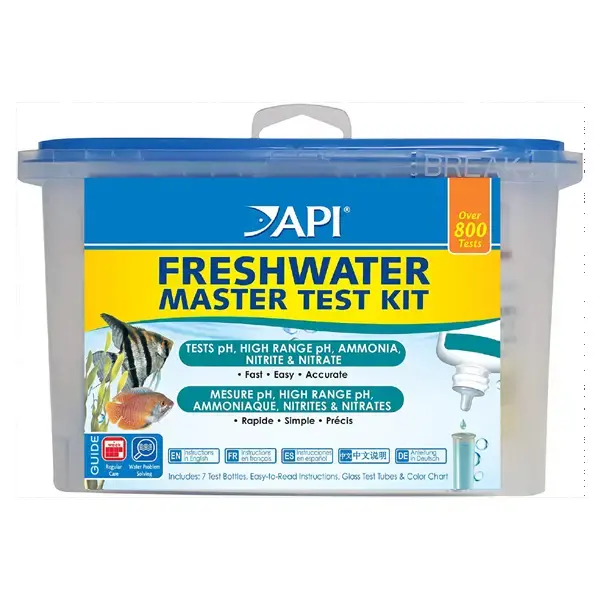 Testing your water regularly helps you monitor key parameters like ammonia, nitrites, nitrates, and pH. These affect your fish’s health and the overall balance of the tank. A liquid test kit is more accurate than test strips and should be part of your regular maintenance routine.
Testing your water regularly helps you monitor key parameters like ammonia, nitrites, nitrates, and pH. These affect your fish’s health and the overall balance of the tank. A liquid test kit is more accurate than test strips and should be part of your regular maintenance routine.
7. Substrate (Gravel or Sand)
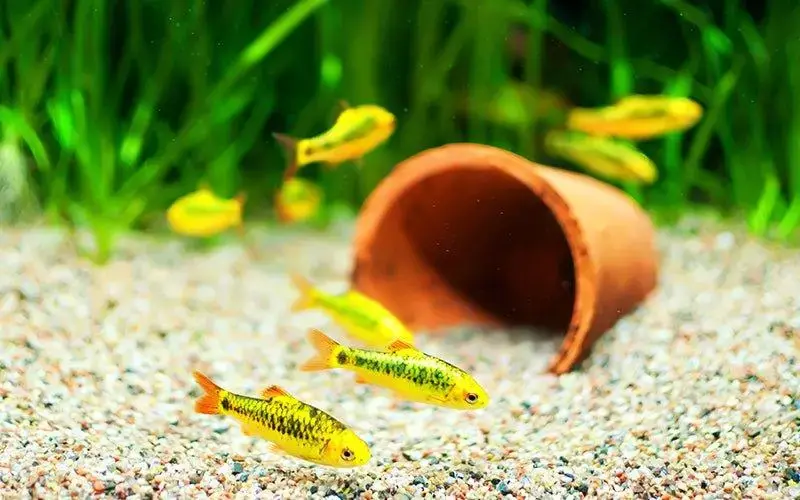 The substrate is the material that lines the bottom of your tank. Gravel and sand are the most common options and provide a base for plants, décor, and beneficial bacteria. Choose a substrate that matches your fish’s needs—some fish prefer sand, while others do better with gravel.
The substrate is the material that lines the bottom of your tank. Gravel and sand are the most common options and provide a base for plants, décor, and beneficial bacteria. Choose a substrate that matches your fish’s needs—some fish prefer sand, while others do better with gravel.
Make sure to rinse the substrate thoroughly before adding it to your aquarium.
8. Aquarium Net
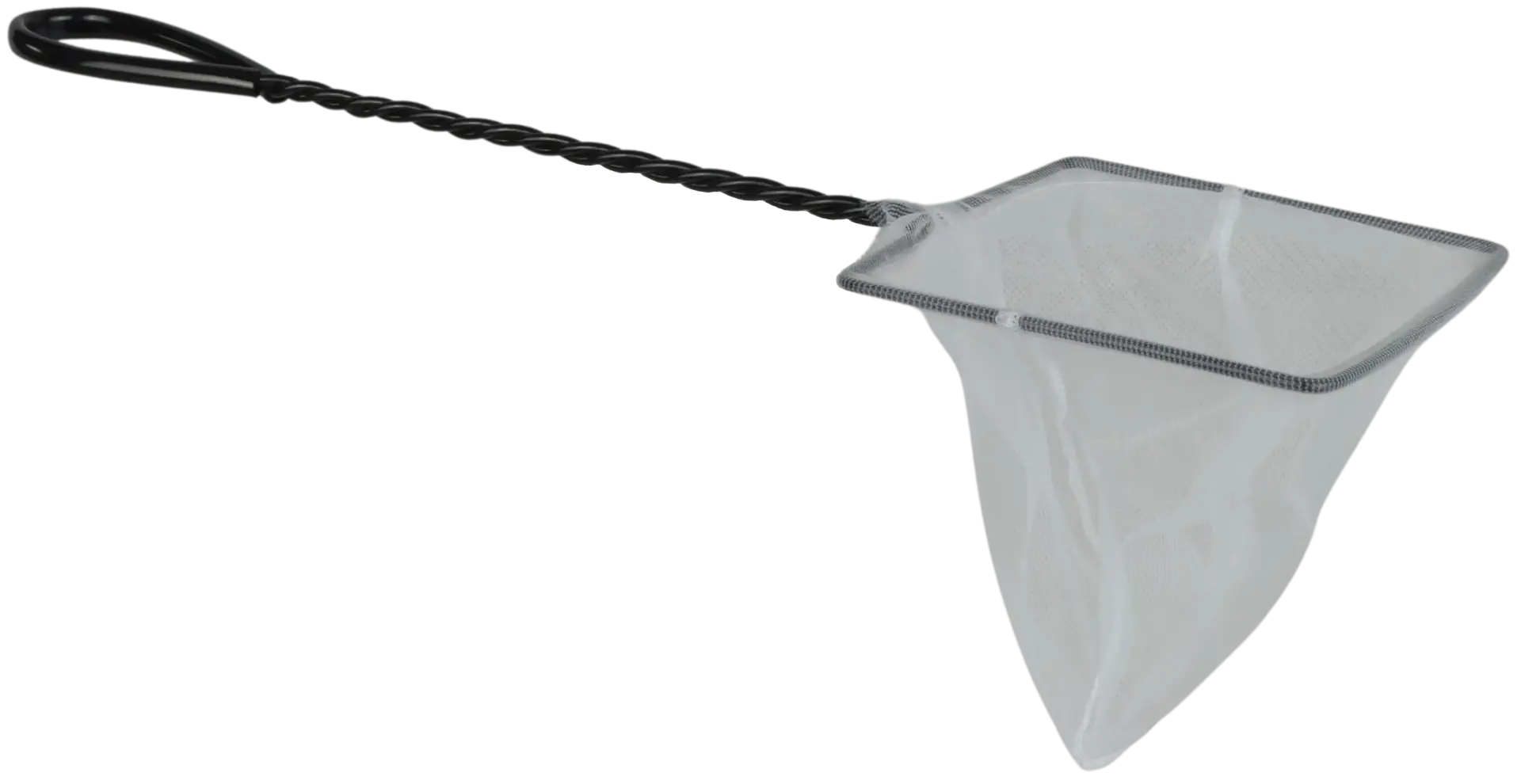 A fish-safe net is used to move fish during cleaning or when transferring to a different tank. It’s a simple but necessary tool. Choose one that’s appropriately sized for your fish and made with soft mesh to avoid harming their delicate fins.
A fish-safe net is used to move fish during cleaning or when transferring to a different tank. It’s a simple but necessary tool. Choose one that’s appropriately sized for your fish and made with soft mesh to avoid harming their delicate fins.
9. Lighting System
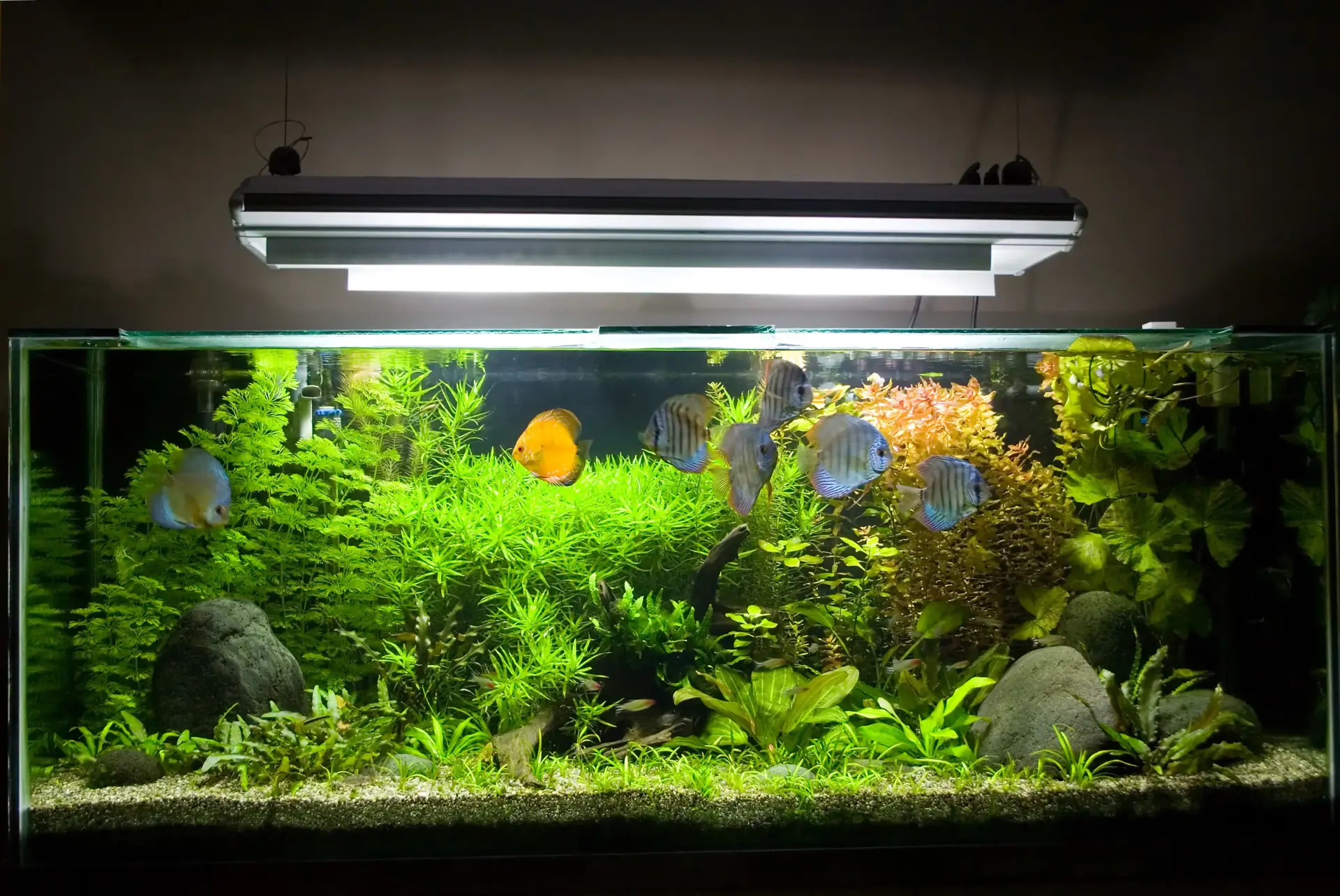 Proper lighting not only enhances the appearance of your tank but also supports the growth of live plants and keeps fish on a natural day-night cycle. For beginners, an LED aquarium light is a great choice. Many aquarium kits come with built-in lighting, but make sure it provides adequate brightness for your tank size.
Proper lighting not only enhances the appearance of your tank but also supports the growth of live plants and keeps fish on a natural day-night cycle. For beginners, an LED aquarium light is a great choice. Many aquarium kits come with built-in lighting, but make sure it provides adequate brightness for your tank size.
10. Gravel Vacuum and Bucket
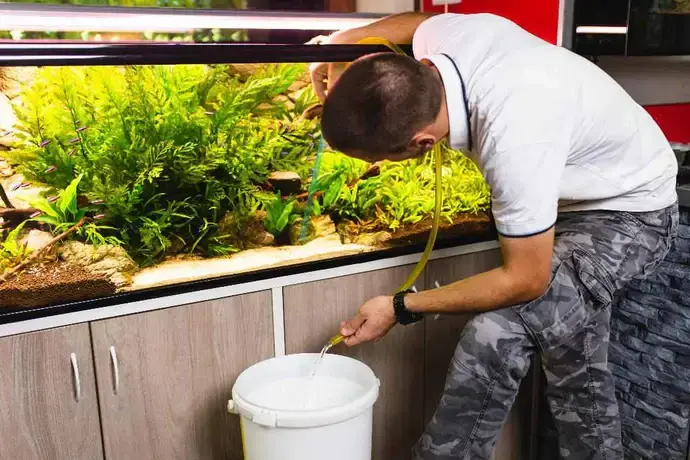 To keep your tank clean, you’ll need to perform regular water changes and substrate cleaning. A gravel vacuum allows you to siphon out debris and uneaten food from the bottom of the tank during water changes. Use a dedicated bucket for aquarium maintenance—never reuse one that’s been exposed to soaps or chemicals.
To keep your tank clean, you’ll need to perform regular water changes and substrate cleaning. A gravel vacuum allows you to siphon out debris and uneaten food from the bottom of the tank during water changes. Use a dedicated bucket for aquarium maintenance—never reuse one that’s been exposed to soaps or chemicals.
Final Thoughts
Setting up your first aquarium is an exciting and rewarding experience. By starting with the right essential equipment, you’ll create a stable, healthy environment that allows your fish to thrive. As you gain experience, you can explore more advanced tools and techniques, but for beginners, this list covers everything you need to get started on the right foot.
Remember, the key to successful fishkeeping is patience, consistency, and proper care. Do your research, follow a maintenance routine, and enjoy the peaceful beauty of your underwater world.

 Choosing the right size tank is one of the most important first steps. While it might seem easier to start small, a larger tank is actually more forgiving for beginners.
Choosing the right size tank is one of the most important first steps. While it might seem easier to start small, a larger tank is actually more forgiving for beginners. 
 If you're keeping tropical fish, a reliable aquarium heater is a must. Most tropical species require stable temperatures between 75°F and 80°F (24°C to 27°C). Choose a heater suitable for your tank size and include an adjustable thermostat for accuracy. Coldwater species like goldfish typically don’t require a heater.
If you're keeping tropical fish, a reliable aquarium heater is a must. Most tropical species require stable temperatures between 75°F and 80°F (24°C to 27°C). Choose a heater suitable for your tank size and include an adjustable thermostat for accuracy. Coldwater species like goldfish typically don’t require a heater. A filter is essential for keeping your tank water clean and your
A filter is essential for keeping your tank water clean and your  Maintaining a consistent water temperature is key to fish health. Use a simple aquarium thermometer—digital, stick-on, or floating—to monitor the temperature regularly. This is especially important if you're using a heater or if the room temperature fluctuates.
Maintaining a consistent water temperature is key to fish health. Use a simple aquarium thermometer—digital, stick-on, or floating—to monitor the temperature regularly. This is especially important if you're using a heater or if the room temperature fluctuates. Testing your water regularly helps you monitor key parameters like ammonia, nitrites, nitrates, and pH. These affect your fish’s health and the overall balance of the tank. A liquid test kit is more accurate than test strips and should be part of your regular maintenance routine.
Testing your water regularly helps you monitor key parameters like ammonia, nitrites, nitrates, and pH. These affect your fish’s health and the overall balance of the tank. A liquid test kit is more accurate than test strips and should be part of your regular maintenance routine. The substrate is the material that lines the bottom of your tank. Gravel and sand are the most common options and provide a base for plants, décor, and beneficial bacteria. Choose a substrate that matches your fish’s needs—some fish prefer sand, while others do better with gravel.
The substrate is the material that lines the bottom of your tank. Gravel and sand are the most common options and provide a base for plants, décor, and beneficial bacteria. Choose a substrate that matches your fish’s needs—some fish prefer sand, while others do better with gravel. A fish-safe net is used to move fish during cleaning or when transferring to a different tank. It’s a simple but necessary tool. Choose one that’s appropriately sized for your fish and made with soft mesh to avoid harming their delicate fins.
A fish-safe net is used to move fish during cleaning or when transferring to a different tank. It’s a simple but necessary tool. Choose one that’s appropriately sized for your fish and made with soft mesh to avoid harming their delicate fins. Proper lighting not only enhances the appearance of your tank but also supports the growth of live plants and keeps fish on a natural day-night cycle. For beginners, an LED aquarium light is a great choice. Many aquarium kits come with built-in lighting, but make sure it provides adequate brightness for your tank size.
Proper lighting not only enhances the appearance of your tank but also supports the growth of live plants and keeps fish on a natural day-night cycle. For beginners, an LED aquarium light is a great choice. Many aquarium kits come with built-in lighting, but make sure it provides adequate brightness for your tank size. To keep your tank clean, you’ll need to perform regular water changes and substrate cleaning. A gravel vacuum allows you to siphon out debris and uneaten food from the bottom of the tank during water changes. Use a dedicated bucket for aquarium maintenance—never reuse one that’s been exposed to soaps or chemicals.
To keep your tank clean, you’ll need to perform regular water changes and substrate cleaning. A gravel vacuum allows you to siphon out debris and uneaten food from the bottom of the tank during water changes. Use a dedicated bucket for aquarium maintenance—never reuse one that’s been exposed to soaps or chemicals.